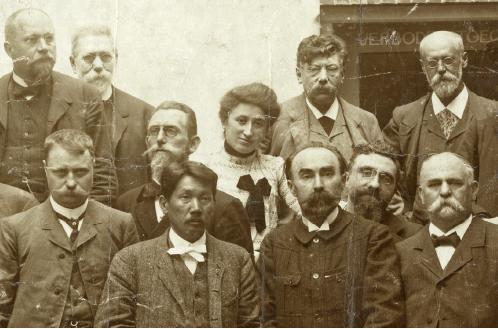Chapter One Hundred Fifteen: The Amsterdam Peace Conference September 1920
“I feel that we must be realistic. The German Revolution has gone as far as it can go without provoking another European War”.
Louise LaGrange to Olivier Martel, Private Correspondence, August 1920.
“Delegates here are preparing not just for Peace, nor even some Eternal Socialist Peace, but something else still. The socialists seem galvanised and major international figures in the movement are walking around Amsterdam as if wearing halos of some divine mission”.
Harold Nicholson, formerly Reform MP for Croydon and Head of the British Observation Delegation at the Peace Conference, writes back to the Prime Minister.
Quite when the Commune committed fully to a negotiated settlement is unclear. Some historians chose to cite the brutality of the Southern Offensive as proof of a desperation to settle the conflict for good. Others point to the stalemate in Germany following the failed Yellow assault on Munich, where Red forces were unable to capitalise on their desperate defensive victory. Still more point to the increasing public hostility to the Commune in both the UK and USA. Whatever the reason, or reasons, by August 1920 it seemed clear to many that the Committee of Public Safety was actively pursuing peace.
The sides came together, after much cajoling and compromise, in Amsterdam in September of 1920 and it was clear from the outset that this was going to be tumultuous for the socialist groups involved. The first motions were clear enough. Romania, now thoroughly defeated, would be obliged to pay reparations to Hungary and relinquish claims on Transylvania. Austria, occupied by Italian, Hungarian, and French troops was forced to hand over everything the Italians wanted from the Tyrol (up to the Brenner Pass), Trieste, and Istria as well as a number of other islands in the Adriatic. The Emperor, who had fled to Greece, was deposed in absentia and the tattered remnants of the Austrian Communard Party placed in power in a Red Republic guaranteed by its neighbours and France. Spain would pay reparations to both France and Italy but not lose territory. Although the Italian delegation pushed for more concessions in this area, Orlando ultimately took what he could with good grace.
It did not take long, however, for the thornier issues of the peace process to threaten the integrity of the project. Many in the international press were left uneasy by the French delegation’s shelving of the Basque issue – the Committee declared it needed ‘time to think upon this ignominious betrayal’ – whatever that meant. Likewise the tension over who owned Galicia between Poland and the Ukraine, which had taken the form of a brief shooting war in August before the French intervened diplomatically, had allowed the new Czech and Slovak Republics to declare themselves sovereign and elect regimes far more Liberal, rather than Socialist, than Paris would have liked.
It was Germany, though, which was the sticking point. Here both France and Italy were united – Germany needed to be divided. The proposal was for Poland to take Poznan and Silesia, then, of the remaining state, the states of Prussia, Saxony, Brunswick, Thuringia, Mecklenburg, and that part of Bavaria bordered by the Donau in the South and the upper Main in the West would be given over to the anti-socialist Republic. The rest, which as the New York Times put it “is essentially everything West of a straight line between Lubeck in the North and Garmisch in the South [including Southern Bavaria]”, was to become a series of Red Republics. Both German delegations hated the solution but it was the “Yellows”, the anti-socialist coalition, who were easiest to win over. The solution offered them survival, the Italians argued, and the opportunity to withdraw their troops peacefully from the Baltic. Every concession, particularly three months of free movement before the borders were fixed, however produced howls of outrage from hardline socialists in Germany. Luxembourg herself took a lot of winning over, locked in a session for four hours with the Committee of Public Safety, but eventually came out and supported the proposal.
The three Montagnard members of the Committee of Public Safety are waved off from Paris by a jubilant crowd.
LaGrange, Martel, and Jorda enjoyed significant popular support and admiration in 1920.
“It creates as many problems as it solves” wrote Martel to Jorda “but it allows the Italians to believe they have a potential alternative ally in the Prussian State, calms the international community, and, crucially, stalls any further need to waste French lives”.
Members of the Committee of Public Safety were not the only leading politicians in Amsterdam though and, by 17th September the International Press began to smell a rat. As the final signatures were appended to the Treaty with Spain, the last of the accords to be signed, the arrival by boat of none other than Chinese President Sun Yat Sen tipped many political pundits off. A much less subtle hint came when the French President, Jean Jaures, appeared at the Gare du Nord alongside leading members of the American socialist movement and Labor Party. Chants of ‘Fourth, Fourth, Fourth, Fourth’ from the huge crowd were greeted with a wry grin by the President who, for the war years had remained somewhat overshadowed by his young Montangard colleagues. Delivering a short speech on the platform before boarding a train for Holland he confirmed that there would be a Fourth International held immediately in Amsterdam to determine ‘the future of France, of Europe, of the World!’.
‘A remarkable challenge to the international powers and also the powers in his own government’ scribbled an impressed young American socialist named James Cannon on the train.
A Map is Coming. I promise.






